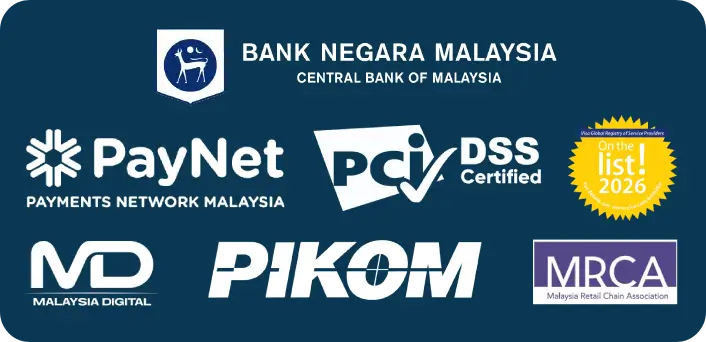
In Malaysia’s rapidly expanding e-commerce market, selecting and evaluating a suitable payment gateway is an important step for businesses planning their online payment setup. A payment gateway facilitates online payments by securely connecting your website or app with banks and financial institutions. Choosing the wrong gateway can lead to lost sales, frustrated customers, and unnecessary expenses.
This guide covers the 7 key factors to consider when evaluating payment gateway options in Malaysia, helping you make an informed decision to enhance your online business.
什么是支付网关?
A payment gateway is a technology solution that securely authorizes online payments by encrypting sensitive payment information and transmitting it between customers, merchants, and banks. It acts as a bridge, ensuring money moves from the customer’s bank or credit card to your business account.
Without a payment gateway, online transactions wouldn’t be possible, especially for e-commerce sites, subscription services, and apps.
Why Payment Gateway Evaluation Matters for Businesses
- Customer Confidence: A trusted, seamless checkout experience reduces cart abandonment.
- Cost Efficiency: Different gateways have varying fees impacting your profit margins.
- Business Growth: Scalable gateways support business expansion, multiple payment types, and international sales.
- Security & Compliance: Ensures your customers’ data is protected, avoiding costly breaches or penalties.
7 Key Factors to Consider When Evaluating Payment Gateways in Malaysia
1. Supported Payment Methods
Malaysia’s payment ecosystem is diverse, driven by the rise of digital payments. Your gateway should support a broad range of popular payment methods to cater to all customers:
- FPX (Financial Process Exchange): Malaysia’s national bank transfer system connecting all major banks. Ideal for customers who prefer direct bank payments.
- DuitNow: Instant real-time transfers via mobile numbers or QR codes, growing fast in popularity.
- eWallets: Popular wallets like Boost, GrabPay, and Touch ‘n Go are widely used for their convenience and rewards programs.
- Credit/Debit Cards: Visa, Mastercard, and local cards remain vital, especially for international buyers.
- QR Code Payments: Widely adopted in physical and online stores for contactless payments.
When evaluating a payment gateway, ensure it supports multiple options so customers have their preferred method available.
2. Transaction Fees and Pricing Structure
Payment gateways typically charge several types of fees:
- Setup Fees: One-time cost to establish your merchant account. Some providers waive this for new businesses.
- Monthly Fees: Recurring fees for maintaining your account or subscription plans.
- Transaction Fees: Charged per transaction, usually a combination of a fixed fee plus a percentage of the transaction amount (e.g., RM0.50 + 2.5%).
- Chargeback Fees: Fees when customers dispute transactions; important to consider if your business has high refund rates.
- Currency Conversion Fees: If accepting international payments, additional fees apply when converting currencies.
Evaluate your typical order size and monthly sales volume to estimate total costs and negotiate where possible.
3. Integration Compatibility
The ease of integrating the payment gateway with your existing website or e-commerce platform is vital for smooth operations:
- Popular platforms like Shopify, WooCommerce, Magento, and BigCommerce have plugins or extensions for many gateways.
- For custom-built sites, ensure the gateway provides a robust and well-documented API with developer support.
- Check for mobile compatibility if you expect mobile shoppers, ensuring the payment process works flawlessly across devices.
Smooth integration reduces technical headaches and improves user experience.
4. Security & Compliance
Security is non-negotiable when handling online payments. Confirm your payment gateway offers:
- PCI DSS Compliance: The Payment Card Industry Data Security Standard is essential for protecting cardholder data.
- SSL Encryption: Ensures that sensitive information is encrypted during transmission.
- Anti-Fraud Tools: Features like 3D Secure, fraud scoring, and tokenization protect your business and customers.
- Regular Security Updates: Gateways should actively update security protocols to combat evolving threats.
Investing in a secure payment gateway safeguards your reputation and customer trust.
5. Settlement Speed
Settlement time is the duration between a successful transaction and the funds being deposited into your bank account:
- Faster settlements improve cash flow, essential for small businesses with limited working capital.
- Some gateways offer next-day or even real-time settlements, while others may take 2-5 business days.
- Consider your business needs and compare settlement policies before deciding.
6. Customer Support Quality
Reliable customer support can save your business from downtime and lost revenue:
- Look for providers offering 24/7 support through multiple channels (phone, live chat, email).
- Support in local languages such as Malay or Mandarin can be very helpful.
- Check reviews or ask other merchants about their experience with the gateway’s customer service.
Good support ensures issues like failed payments or integration glitches get resolved promptly.
7. User Experience and Checkout Options
A smooth checkout process directly impacts conversion rates:
- Offer a mobile-friendly checkout that works seamlessly on smartphones and tablets.
- Allow guest checkout without mandatory account creation.
- Support multiple currencies if you sell internationally.
- Features like saved payment methods, one-click payments, and local payment options enhance convenience.
- Minimizing redirects to external pages can improve trust and reduce drop-offs.
Tips to Get the Best Payment Gateway Deal
- Bundle payment methods: Choose gateways supporting the widest range of local and international options.
- Negotiate fees: Providers may offer discounts based on your transaction volume or contract length.
- Test the gateway: Use sandbox environments to test user experience before going live.
- Check contract terms: Watch for hidden fees, cancellation policies, or minimum monthly transactions.
结论
Choosing the right payment gateway in Malaysia involves balancing multiple factors—from supported payment methods and fees to security and customer experience. Focusing on these 7 key areas ensures you select a payment gateway that meets your business needs, delights customers, and supports your growth in 2025 and beyond.
常见问题
1. Can I switch payment gateways after launching my online store?
Yes, but switching may involve downtime and technical changes. Plan carefully to minimize disruption.
2. Are international payment options necessary for Malaysian SMEs?
If you plan to sell overseas, supporting international cards and currencies is important to reach global customers.
3. How do I know if a payment gateway is PCI DSS compliant?
Most providers display compliance certifications on their website. You can also ask their support team directly.
4. Do payment gateways handle refunds and chargebacks?
Yes, most gateways have features to process refunds and manage chargebacks, but policies vary.
5. What is 3D Secure, and why does it matter?
3D Secure is an authentication protocol adding an extra security layer for card payments, reducing fraud and chargebacks.
6. How can I reduce transaction fees?
Negotiate with providers based on your volume, or choose gateways with tiered pricing or no setup fees.
我们的合作伙伴 :






